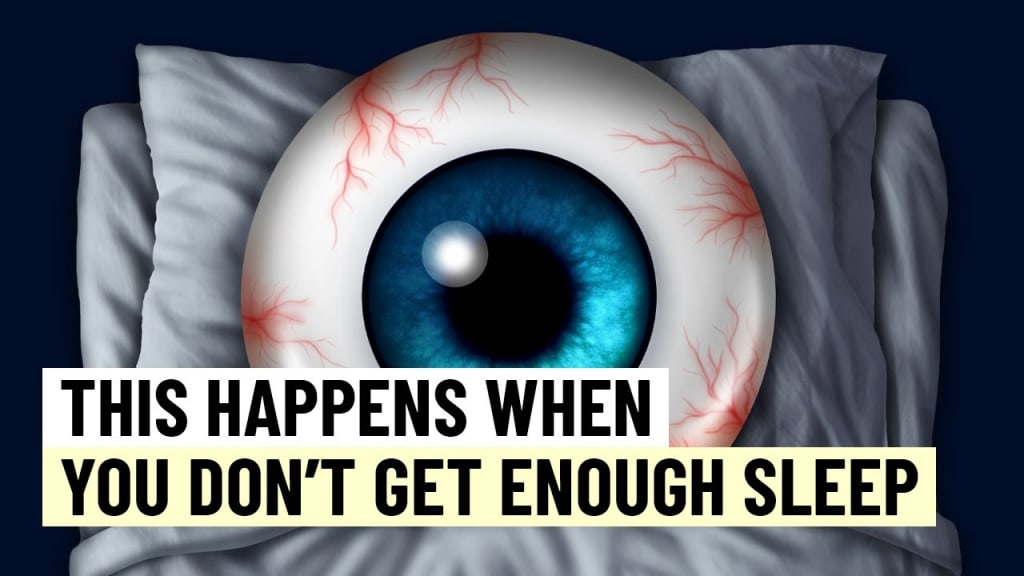What Happens To Your Body When You Don't Get Enough Sleep
If you've ever tossed and turned all night, you're familiar with that awful feeling the next day. A bad night's sleep leaves you feeling exhausted, grumpy, and just out of it. If you regularly get less than 7 to 9 hours of sleep, which is the recommended amount for healthy adults, you'll be more than tired and irritable. Sleep deprivation has some very real long-term consequences. When you don't get enough sleep, your brain and bodily systems can't function properly, negatively impacting the overall quality of your life. So let’s take a closer look at how a lack of sleep affects your bodily functions!

What Happens to Your Body When You Don't Get Enough Sleep
If you've ever tossed and turned all night, you're familiar with that awful feeling the next day. A bad night's sleep leaves you feeling exhausted, grumpy, and just out of it. If you regularly get less than 7 to 9 hours of sleep, which is the recommended amount for healthy adults, you'll be more than tired and irritable. Sleep deprivation has some very real long-term consequences. When you don't get enough sleep, your brain and bodily systems can't function properly, negatively impacting the overall quality of your life. So let’s take a closer look at how a lack of sleep affects your bodily functions!
Number 1 - Central Nervous System Your central nervous system serves as the main information highway for your entire body and sleep is necessary to keep it functioning properly. Chronic sleep deprivation, on the other hand, interferes with this flow of information. Lack of sleep leaves your brain exhausted and fatigued, making it unable to perform its functions effectively. You can have difficulty concentrating or learning new things. The signals your body sends may also be delayed, which can impair your coordination and increase your risk for accidents. Furthermore, sleep deprivation has been shown to have a negative impact on your mental and emotional state. You could find yourself becoming more impatient or prone to mood swings. It can also impair decision-making. Prolonged sleep deprivation can lead to hallucinations as well, and it can trigger mania in people who have bipolar disorder.
Number 2 - Immune System During sleep, your immune system produces substances such as antibodies and cytokines. They protect you from illness and fight infection. These substances combat foreign invaders like bacteria and viruses. Certain cytokines also aid sleep, increasing the effectiveness with which your immune system can defend your body against illness. Unfortunately, sleep deprivation hinders your immune system's ability to build up its defenses. If you don't get enough sleep, your body may not be able to fight against invaders, and recovering from illness may take longer.
Number 3 - Respiratory System The respiratory system and sleep have a symbiotic relationship. But some diseases and disorders can get in the way and throw things off. For example, a nighttime breathing disorder, called obstructive sleep apnea, can disrupt and reduce the quality of your sleep. Waking up several times each night because of sleep apnea can lead to sleep deprivation, making you more susceptible to respiratory illnesses such as the common cold or flu. Not getting enough sleep can also exacerbate existing respiratory disorders, such as chronic lung disease.
Number 4 - Digestive System Along with overeating and a lack of physical activity, sleep deprivation is a risk factor for becoming overweight or obese. Sleep affects ghrelin and leptin levels, two hormones that govern feelings of hunger and satiety. Lack of sleep is linked to higher levels of the appetite-stimulating hormone ghrelin, and lower levels of the satiety-inducing hormone leptin, resulting in an increase in hunger and appetite, particularly for foods high in fat and carbs. The fluctuation of these hormones might explain munching or overeating late at night. Furthermore, sleep deprivation results in reduced physical activity, which can lead to weight gain over time since you aren't burning enough calories. It also causes your body to produce less insulin after you eat, reducing your body's glucose tolerance. And these disruptions can lead to diabetes and obesity.
Number 5 - Cardiovascular System When you don't get enough sleep, your risk of developing cardiovascular problems increases. That's because your heart and blood vessels don’t get the necessary rest and repair to keep them functioning effectively. And since chronic sleep deprivation contributes to weight gain, it can exacerbate issues such as high blood pressure, stroke, and heart disease.
Number 6 - Endocrine System Sleep also has a significant impact on hormone production in the body, and not getting enough Zzz's can seriously throw your hormones out of whack. For instance, you need at least 3 hours of uninterrupted sleep for optimal testosterone production to occur. Waking up several times during the night can disrupt that. Sleep disruptions may also impair the production of growth hormones which are required for the body to build and maintain muscle mass and repair cells and tissue, among other vital functions.
The human body, like all machines, is subject to wear and tear and requires time to recover, both physically and mentally. It goes without saying, that the best way to deal with a lack of sleep is to make sure you get enough each night. It's also critical to ensure that you're getting quality sleep. If you want some tips that can help you get back on track with a healthy sleep schedule, you can check out a video we made a little while back. The link is in the description below.
If you make the necessary lifestyle changes and continue to have trouble sleeping or experience chronic fatigue during the day, it's time to talk to your doctor. They can work with you to identify the source of the problem and develop a treatment plan to help you get some rest.
About the Creator
Enjoyed the story? Support the Creator.
Subscribe for free to receive all their stories in your feed. You could also pledge your support or give them a one-off tip, letting them know you appreciate their work.






Comments
There are no comments for this story
Be the first to respond and start the conversation.